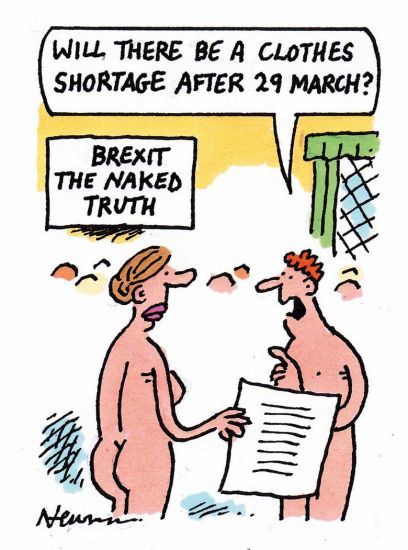
The UK’s imminent departure from the European Union has undoubtedly been a source of anger for many academics – and, with the clock ticking on parliamentary negotiations, some are prepared to express it through increasingly bold demonstrations. In a sure display of “don’t get mad, get naked”, Victoria Bateman, an economics fellow at the University of Cambridge, opted to stage a nude talk on 14 January to expose the “naked truth” of Brexit. Dr Bateman is no stranger to public exposure – in 2016 she made headlines after walking naked into a faculty meeting with “Brexit leaves Britain naked” written across her breasts. An invitation for the recent event promised free entry and the chance for attendees to sign the “first living human petition” against a no-deal. “Expect impassioned argument and nudity in equal measure,” guests were told.
Continuing on an X-rated theme, students at Arizona State University recently put right a grave injustice – having no access to pornography – thanks to a hard-hitting investigation by a local newspaper reporter. The porn drought ended after the Arizona Republic asked about the university campus wi-fi’s access restrictions on adult content and was told that a temporary block had “inadvertently” been held for too long. An ASU official explained that website restrictions were only usually set in place for the summer months, when a large number of children and families were on campus. The restrictions have since been removed, gifting thousands of students the right to waste their working hours once again. “God bless you,” one student wrote to the journalist on Reddit. “Now we can watch porn in the library.”
USC, SCU, CDU, CSU: it can be hard to distinguish Australian universities from each other, or from German centre-right political parties. Now one of those universities, Charles Sturt University (named after a British explorer), has had enough, but alumni are opposing a proposed name change. “One-name universities don’t get shortened,” said CSU’s deputy vice-chancellor for students, Jenny Roberts. The institution’s favoured new name is Sturt University, although alternative monikers, including Wiradjuri – a grouping of Aboriginal peoples whose traditional lands encompass CSU’s major campuses – have also been suggested. A petition signed by more than 5,000 people says that changing the name “erodes the identity, tradition and history of the previous generations who have attended, studied and worked” at CSU. Nonetheless, the pressing need to stand out from the competition in today’s marketised sector may well trump tradition.
Humour is a matter of taste – a lesson learned the hard way by Peter Boghossian, a US academic who has spent several months defending a hoax designed to embarrass academic explorations of race and gender, yet who now faces the possibility of losing his job under scrutiny from his own university. Dr Boghossian, a non-tenured assistant professor of philosophy at Portland State University, and two fellow authors from outside academia described their project – which duped several big academic publishers into publishing bogus papers on subjects such as the use of sex toys to confront homophobia – as an exposé of “grievance studies” and a “culture of scholarship that values a type of radical left-wing activism over the pursuit of truth”. To do that, they in effect enlisted editors and reviewers at the targeted journals as part of the study, an action that represented “a clear violation” of PSU policies requiring institutional review board approval of research involving human subjects, a senior university manager explained to him in a letter. The punchline is that Dr Boghossian may soon have his own grievance to study.
As the UK’s war on essay-writing websites continues, one has been sent down after claiming to provide “Oxbridge” quality submissions. The Advertising Standards Authority banned as misleading a promotion for Oxbridge Essays that implied that students could “submit purchased essays as their own without repercussions”. The company also claimed that the “vast majority” of its writers had studied at the University of Oxford or the University of Cambridge, an assertion struck out by the regulator when it learned that only 71 per cent of authors had. It is the second time that Oxbridge Essays has been punished by the regulator, but it denies any wrongdoing and has submitted an appeal. “We do not condone academic cheating of any kind and our website makes it very clear how to use our service correctly,” the company insisted.
请先注册再继续
为何要注册?
- 注册是免费的,而且十分便捷
- 注册成功后,您每月可免费阅读3篇文章
- 订阅我们的邮件
已经注册或者是已订阅?